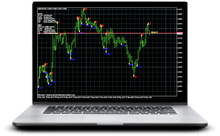The Role Of Demo Accounts In Practicing And Testing Trading Strategies

In the fast-paced trading world, a demo account has become an irreplaceable tool providing users with many opportunities to explore the financial markets and refine their trading skills. Demo accounts offer traders a risk-free practice in simulated market conditions with real-time price data using virtual capital. When using demo accounts, traders experience almost the same challenges and winnings as they would have in live trading. It is a demo account that allows traders to learn the market, test new strategies, and gain confidence.
In this article, we will talk about the significance of demo accounts in practicing and testing trading strategies. Specifically, you will learn about the demo account's powerful and weak sides, why pro traders turn to this type of account, and how you can benefit from using a risk-free trading platform.
Specifics of a demo account: learning the differences from a real trading account
Before using a demo account, it is essential to find out its specifics to realize the significance and importance of this versatile trading opportunity. Traders should understand the purpose of demo accounts and learn how they can benefit from using them instead of real trading accounts.
Virtual capital
The critical trait of demo accounts is the replacement of real funds with virtual ones. A demo account provides traders with virtual capital you cannot lose or convert into cash. In contrast, a real trading account necessarily requires traders to deposit and trade with their real money.
Order execution
- Slippage
Demo trading accounts simulate real market conditions but do not grant access to the interbank market. Using a demo account helps traders avoid delays or slippage in executing positions. Slippage occurs in live trading when orders are executed at less favorable prices due to fast market changes. As slippage relies on another party's ability to execute orders, it is exclusive to live trading and does not occur in a demo environment.
Demo accounts usually provide traders with fixed and tight spreads. However, on real trading accounts, spreads are dynamic and vary depending on the market situation, liquidity, and the broker's requirements. Static spreads on a demo account enable traders to learn financial markets and refine their trading approaches. In contrast, a real market with constantly changing spreads makes traders adapt and sometimes suffer particular losses.
Emotional factors
Trading with a demo account helps traders avoid emotional breakdowns and burnouts because no real money is at stake. Conversely, on real accounts, traders usually become too emotional and experience panic trading, which causes inevitable losses and psychological issues.
Demo accounts imply no actual consequences, preventing traders from the fear of missing out or overtrading.
Influence on trading strategies
As it goes from the core, a demo account is a training mode for traders. With the help of demo accounts, users can test their trading strategies and techniques in a risk-free environment for experimentation and learning. In contrast, a real market requires traders to adjust their strategies following live market changes, keeping them in suspense all the time. So, trading on real accounts makes testing and improving your trading approach in cold blood difficult.
Why do professionals use demo accounts, or when returning to this type of trading account is useful?
Every professional knows that the critical aspect of success is constant learning. Aiming to improve trading skills, all seasoned traders realize the value and indispensability of demo accounts in trading. So, when do traders enlist the help of demo accounts? Why even being a pro trader it's essential to use it from time to time? Let's learn!
Developing and testing trading strategies
Developing and testing trading strategies is crucial to a successful trading career. As we mentioned above, demo trading accounts play a prominent role in this training practice. Traders who incorporate demo accounts in their trading routine can operate in a risk-free environment using virtual funds to explore, improve or change their strategy.
Traders of all levels have an opportunity to assess the effectiveness of a selected strategy and make certain adjustments to adapt their approaches to the market conditions without overwhelming emotions. On demo accounts, traders gain confidence in their strategy and prove their prospective success before live trading.
By using demo accounts, traders can track the results of the trades performed in a simulated reality. Then, based on this historical data, it will be comfortable to examine the whole picture of the strategy's effectiveness and rationality, assessing the correctness of risk management planning and decision-making process.
Usually, both novice and seasoned traders face complications in determining stop-loss and take-profit levels. Newbies close positions immediately after they see it's possible to make any profit, while professionals may drag out with closing positions waiting for a larger profit. A demo account helps traders learn how to place stop-loss and take-profit orders most efficiently and helps control traders' exposure to price changes in a preferable direction.
When practicing and testing trading strategies in a risk-free environment, traders undeniably raise their chances of succeeding in live trading. A demo account is a wise decision for elaborating your skills and approaches before risking real funds.
Resetting trading psychology
Oftentimes, trading is emotionally challenging, and even professionals can face different psychological issues such as fear of missing out, overtrading, random reinforcement, revenge trading, gambling trading, or trading based on herd instinct. These mental problems inevitably cause a messy decision-making process and then losses. When traders return to demo accounts, they reinforce their unbiased and successful trading as demo accounts provide them with a safe space to recover emotionally, regain objectivity, refine risk management, and rebuild discipline.
New market conditions, frequent losses, personal issues, and constant discipline breaks can undermine a trader’s self-confidence. However, demo accounts allow traders to regain confidence and restore emotional readiness. The stress-free climate of a demo account gives traders opportunities to restore a sense of self-control and positive thinking.
Testing new tools and robots
Demo accounts allow traders to test various tools and robots without fear of losing their deposits. The practice of testing trading tools or robots on demo accounts became widespread and rational, allowing traders to assess the functionality and performance of new technologies. Moreover, traders have all the opportunities to examine the impact of these tools on trade execution, risk management, and overall profitability. Traders can analyze the outcomes of simulated trades and evaluate the suitability of utilized tools or robots for their current trading strategy.
With demo accounts, you can determine the limitations and glitches of incorporated technologies. Without any financial risks, traders thoroughly analyze new tools or robots and ensure they are reliable for live trading in different market scenarios.

Drawbacks of demo trading
While demo accounts offer a significant number of benefits, there are some disadvantages you should take into account. These downsides include the following:
Lack of emotional involvement
With demo accounts, traders cannot observe real emotions due to the absence of real funds at stake. When trading on demo accounts, there is no real tension, worries, or an overwhelming sense of happiness. However, emotion control is vital in trading. It impacts your decision-making process and the development of emotional discipline.
When novice traders start from a demo account and make large profits in a relaxed manner, they experience an unrealistic perception of trading success, thinking trading is easy. As a result, newbies fall into the trap of overwhelming emotions and panic trading leading to substantial losses when shifting into live trading.
Ignorance of risk management
Since on demo accounts traders operate with a virtual deposit, they often underestimate the importance of having a well-developed risk management plan in place. Traders don’t care enough about the potential events affecting the market and are not prepared for unexpected price movements.
Absence of slippage and execution challenges
Demo accounts provide immediate order executions by the requested price far more frequently than live trading. Here, traders do not face any requotes, slippage, or delays that are essential to trading.
Market depth’s limitations
Demo accounts often provide limited market depth, especially for stocks and other high-volume instruments. The lack of full market depth on demo accounts may constrain the trader's ability to evaluate market liquidity or determine entry or exit points.
How to enhance the realism of your demo trading?
The weak sides of a demo account challenge traders’ readiness for the realities of live trading. However, being aware of these downsides of demo accounts allows traders to take reasonable steps to make demo trading more realistic. Here is some advice:
- Treat demo accounts as real and do not delay using them.
- Cultivate discipline and work with your mentality.
- Trade with a similar deposit size as you would prepare for a real account.
- Track your trading and make conclusions.
- Develop your risk management, no matter if it’s a demo account.
Summary
A demo account is an excellent option for traders of all levels to develop their trading approaches and try new technologies in a risk-free environment. Traders can determine the effectiveness of their trading strategy and assess the performance of certain trading tools or algorithms before implementing them into real trading. However, it’s crucial to understand some weak sides of a demo account, including fixed spreads, absence of slippage and limited emotional investment. Being aware of the drawbacks helps you to trade on a demo account more profoundly and usefully.
FAQ
Demo accounts: an indicator of trading skills?
Demo trading and live trading have significant differences that determine your true success in trading. With a demo account, you can become familiar with financial markets, find the most efficient trading approach, and gain confidence. However, some aspects of live trading, such as risk management, emotional reactions, and order execution, are not elaborated enough during demo trading. That's why it's challenging to assess your skills before live trading.
How is demo trading different from live trading?
In a nutshell, demo trading involves virtual funds, while in live trading, you operate with real financial investments and incur actual risks of losses. On demo trading, you can test trading strategies emotionless, while live trading evokes dealing with emotions.
How does a demo account work?
A demo account enables users to trade in a simulated trading platform, replicating real market conditions without involving real finances. With demo accounts, traders can explore the market, test and adjust their strategies, and gain experience in a risk-free environment.
How do successful traders use demo accounts to improve trading?
Most pro traders return to demo accounts from time to time. Professionals develop their current strategies or test new ones using demo accounts. Often, traders consider demo accounts as an opportunity to recover emotionally and regain confidence. Moreover, demo accounts allow professionals to test the effectiveness of new tools and algorithms.
What is a Forex demo account?
A Forex demo account is a virtual trading account provided by Forex brokers to explore the Forex market, try to trade various currencies, and gain a particular experience.
This is for informational purposes only and does not constitute investment advice, suggestions, or recommendations for trading.




